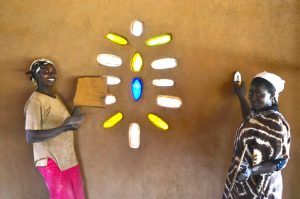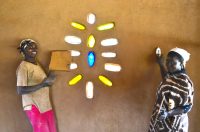This November the UN Climate Summit (COP23) will be held in Bonn, Germany, where the imperative will be how to massively scale-up and effectively implement the Paris Climate Agreement. The Global Ecovillage Network (GEN) strongly believes that sustainable communities are already making significant contributions to climate change mitigation and adaptation. It is GEN’s mandate to underscore the importance that ecovillages are making towards our collective climate commitments.
For decades, GEN has been showing how regenerative permaculture solutions and ecovillage approaches to sustainable development are making a significant contribution to drawing down carbon from the atmosphere and reversing global warming. From low-tech natural carbon sequestration techniques, regenerative agricultural practices, large scale water retention landscape regeneration methods, and radically low ecological footprints, ecovillages are demonstrating that the changes in lifestyle and consumption, along with the best practices needed to achieve ecological sustainability, are attractive and attainable.
With your help we can continue this work. GEN has put together a crowdfunding campaign to 1) enable a platform for four ecovillage experts, all hailing from the Global South, to attend COP23, and 2) support the ongoing development of our Pan-African Ecovillage Development Programme which addresses both climate mitigation and adaptation.

By Rob Wheeler, Yvette Dzakpasu, & Kosha Joubert
Shifting Sands: Governments Supporting Ecovillage Solutions
Since last year, a spectacular process has emerged, though it is still flying somewhat under the radar. At COP22, twenty-two governments expressed their interest to work with us to initiate Ecovillage Development Programmes. These programmes support the large-scale transition of rural communities and urban neighbourhoods into ecovillages. This year, GEN aims to scale up and deepen its partnerships with governments, NGOs, and donors to implement policies and solutions at local, regional, and international levels. For GEN, COP23 is an opportunity to catalyse the power of community for the national implementation of the UN Sustainable Development Goals and Paris Climate Agreement.
This year GEN will also be partnering with Project Drawdown and showcasing a selection of their 80 key approaches for drawing carbon down from the atmosphere. We are also busy collaborating with the Commonwealth countries’ initiative on Regenerative Development for Reversing Climate Change; the International National Trusts Organisation’s efforts to preserve Natural and Cultural Heritage; Open Team’s programmes to support collaborative actions on regenerative development and climate change; the Nordic Folke Center’s work to bring small scale renewable technologies to the developing world; and Zero Carbon Britain’s work on developing pathways to transition to a 100% renewable energy future, among others.
GEN’s Ecovillage Development Programme
These exciting developments have not occurred in a vacuum. For the past 20 years GEN and its regional affiliate, GEN Africa, have been working hard to develop a transformative model, using an integrated, community-based approach to create sustainable and resilient ecovillage communities. This has now grown to become the Ecovillage Development Programme which is radically reforming current development practices and putting communities, sustainability, and wealth creation at the heart of development.
As a scalable process, firstly, GEN invites strong, inspiring communities within a country or region to learn more about the ecovillage movement. Second, it facilitates an Ecovillage Development Training for local stakeholders with each of the identified villages identifying their needs, assets and leverage points. Third, it facilitates further demand driven trainings to prepare and share skills for implementation. Fourth, GEN assists communities to measure and evaluate the outcomes to see what works and what needs to be improved. Finally, GEN assists with refining the implementation plan the communities have developed, continuing on with project implementation.
Examples of the types of best practices and success stories used in ecovillages can be found in GEN’s Solution Library and our Climate Solutions webpage and will also be shared at COP23 as we focus on the development of the Pan-African Ecovillage Development Programme.
The Time to Act Is NOW
Recent studies show that holistic, community-led development leads to more superior outcomes in meeting SDG targets than conventional top-down development. The growth of ecovillages – intentional, conventional, rural or urban communities which democratically design the regeneration of their social and natural environments – is a powerful catalyst to sustainable behaviour and policy change. CO2 emissions are 60% lower in surveyed ecovillages compared to country averages. And with studies showing ecovillages developing and disseminating large scale, affordable, regenerative technology, and incubating record-breaking numbers of social enterprises, ecovillages are catalysts and incubators of change in their regions. Our programmes are advancing a vision which hold these characteristics as standard.
As the effects of climate change increase in intensity and impact, both Globally Northern and Southern become more vulnerable together. The recent devastating hurricanes and droughts in both Asia and the United States have only further illustrated this. As we know, humanity is already living well beyond the carrying capacity of the earth. Climate change is leading to deaths, population movements and political volatility. Societal norms are facilitating unsustainable consumption. Communities need support to build regenerative institutions, change behaviour, and build policy support for carbon reductions instead. Let us act in international solidarity to build a regenerative future.
You can support GEN by donating to our crowdfunder here. You can stay tuned for updates on our activities at COP23 and our wider work through our website.














